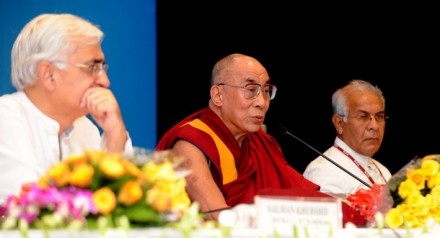
His Holiness said except for some problems, India as the world’s most populous democracy has largely been very stable compared to many of its neighbors because the country has a very ancient and rich tradition of non-violence and religious harmony.
Stressing on the universality of moral ethics in cultivating inner peace, he said some people mistakenly believe that moral ethics are based on religious values. If that was so, then it can never be universal because the reality is there are so many religious traditions, he added. Secular ethics relate to all of us as the same human beings using our common experience, common sense, and latest scientific findings to make positive changes in oneself and others, he said.
Lack of moral ethics which leads to undermining of self-discipline, His Holiness said, is responsible for many societal ills like corruption that plague countries like China and India.
His Holiness said many problems in the world today are man-made with too much negative emotions deluding the mind with negative emotions in such a way that we become slaves to destructive actions. Through training and awareness, one can transform negatives emotions into positive emotions.
He said just like the external matters, in the world of mind, there are many different emotions, some very useful and beneficial in bringing inner strength, self-confidence, all positive emotions that enable one to have a sense of concern for others’ well-being and see others as one’s own.
His Holiness said scientists today are increasingly involved in studying and researching phenomena that are formless, mysterious, and defies human understanding. “Now they are looking inside at being, self, and emotions as something that is very related to day-to-day life,” he added.
Reiterating that he rightly considers himself as son of India, His Holiness said, “Every cell of my brain is filled with Nalanda Thought and my body for the last fifty years is survived by Indian dal and chawal.” He recalled making this clarification to an overseas Chinese journalist who expressed his curiosity over this remark.
Speaking on his recent devolution of political authority to an elected political leadership, His Holiness said he is happy he has implemented in full what he had been saying for years. “I always say the world belongs to the humanity, the people, not to kings and religious leaders; just as each country belongs to its people , not to a political party or a raja.”
Calling democracy the best system of governance, His Holiness said he had since childhood in Tibet wanted change in the system. In exile, he said he was happy to have the opportunity to introduce democracy in the Tibetan community. Ever since Tibetans began to directly elect their Kalon Tripa, the elected Tibetan political leadership in 2001, His Holiness said he was in a semi-retired position. He said he has “happily, voluntarily and proudly” given up the political authority he had taken over at the age of 16. “The last 60 years was a difficult period but now at 76, as an old monk, I have my own right to retire.”
Mr Salman Khurshid, Union Minister for Minority Affairs and Law and Justice also addressed the gathering. Shri Wajahat Habibullah, Chairman of NCM, gave the welcome address and Dr. H.T. Sangliana, Vice-Chairperson of NCM thanked the guests at the event.
Among the guests were members of Parliament, Election Commission, Planning Commission; political leaders; academicians; writers; artists; and foreign diplomats.
Last year’s lecture was delivered by Dr APJ Abdul Kalam, former president of India. Justice A.M. Ahmadi, Former Chief Justice of India and Justice Rajinder Sachar, Former Chief Justice of Delhi High Court gave the first and second annual lectures.
The National Commission for Minorities is a body constituted by the Government of India to monitor and evaluate the progress of people classified as minorities by the Indian government.
